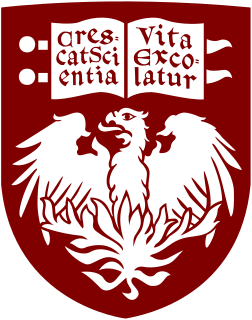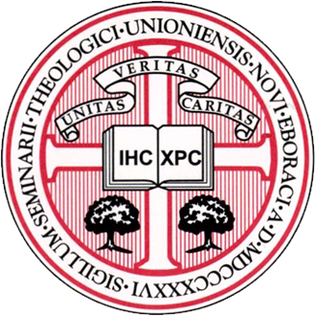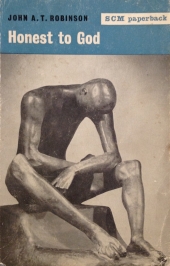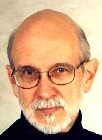Langdon Brown Gilkey (February 9, 1919 – November 19, 2004) [1] was an American Protestant ecumenical theologian.
Langdon Brown Gilkey (February 9, 1919 – November 19, 2004) [1] was an American Protestant ecumenical theologian.
A grandson of Clarence Talmadge Brown, the first Protestant minister to gather a congregation in Salt Lake City, Gilkey grew up in Hyde Park Chicago. His father Charles Whitney Gilkey was a liberal theologian and the first Dean of the University of Chicago's Rockefeller Chapel; his mother was Geraldine Gunsaulus Brown who was a well known feminist and leader of the YWCA. [2]

Salt Lake City is the capital and the most populous municipality of the U.S. state of Utah. With an estimated population of 190,884 in 2014, the city is the core of the Salt Lake City metropolitan area, which has a population of 1,153,340. Salt Lake City is further situated within a larger metropolis known as the Salt Lake City–Ogden–Provo Combined Statistical Area, a corridor of contiguous urban and suburban development stretched along a 120-mile (190 km) segment of the Wasatch Front, comprising a population of 2,423,912. It is one of only two major urban areas in the Great Basin.

The University of Chicago is a private research university in Chicago, Illinois. Founded in 1890 by John D. Rockefeller, the school is located on a 217-acre campus in Chicago's Hyde Park neighborhood, near Lake Michigan. The University of Chicago holds top-ten positions in various national and international rankings.

Rockefeller Chapel is a Gothic Revival chapel on the campus of the University of Chicago in Chicago, Illinois. A monumental example of Collegiate Gothic architecture, it was meant by patron John D. Rockefeller to be the "central and dominant feature" of the campus; at 200.7 feet it is by covenant the tallest building on campus and seats 1700.
Gilkey attended elementary school at the University of Chicago Laboratory School, and in 1936 graduated from the Asheville School for Boys in North Carolina. In 1939 he earned an A.B. degree in Philosophy, magna cum laude, from Harvard. The following year (1940) he went to China to teach English at Yenching University and was subsequently (1943) imprisoned by the Japanese, first under house arrest at the University and later in an internment camp near the city of Weihsien in Shantung Province (where Eric Liddell was a fellow internee). [3]

Asheville School is a private, coeducational, University-preparatory boarding school in Asheville, North Carolina founded in 1900. The campus sits on 300 acres (120 ha) amid the scenic Blue Ridge Mountains and currently enrolls 295 students in grades nine through twelve. The campus was named by Architectural Digest magazine in 2018 as the most beautiful private school campus in North Carolina. The school was ranked the seventh best boarding school in the U.S. by independent education organization TheBestSchools.org.

North Carolina is a state in the southeastern region of the United States. It borders South Carolina and Georgia to the south, Tennessee to the west, Virginia to the north, and the Atlantic Ocean to the east. North Carolina is the 28th-most extensive and the 9th-most populous of the U.S. states. The state is divided into 100 counties. The capital is Raleigh, which along with Durham and Chapel Hill is home to the largest research park in the United States. The most populous municipality is Charlotte, which is the second-largest banking center in the United States after New York City.

Yenching University, was a university in Beijing, China, that was formed out of the merger of four Christian colleges between the years 1915 and 1920. The term "Yenching" comes from an alternative name for old Beijing, derived from its status as capital of the state of Yan, one of the seven Warring States that existed until the 3rd century BC.
After the War, Gilkey obtained his doctorate in Religion from Columbia University in New York, being both mentored by and a teaching assistant to Reinhold Niebuhr. He was a Fulbright scholar at Cambridge University (1950–51), and went on to become a professor at Vassar College from 1951 to 1954, and then at Vanderbilt Divinity School from 1954 to 1963. [4] He received a Guggenheim Fellowship in 1960 to study in Munich; another Guggenheim in the mid-1970s took him to Rome. In late 1963 he became a professor at the University of Chicago Divinity School, eventually being named Shailer Mathews Professor of Theology, until his retirement in March 1989. While on sabbatical in 1970, he taught at the University of Utrecht in the Netherlands; in 1975 he taught at Kyoto University in Japan, his lecture series there focusing on the environmental perils of industrialization. After his retirement he continued to lecture until 2001 at both the University of Virginia and Georgetown University. [1] During this last period of his teaching career, he was also for one year a visiting professor at the Theology Division (now Divinity School) of Chung Chi College, the Chinese University of Hong Kong.

Columbia University is a private Ivy League research university in Upper Manhattan, New York City. Established in 1754, Columbia is the oldest institution of higher education in New York and the fifth-oldest institution of higher learning in the United States. It is one of nine colonial colleges founded prior to the Declaration of Independence, seven of which belong to the Ivy League. It has been ranked by numerous major education publications as among the top ten universities in the world.

The City of New York, usually called either New York City (NYC) or simply New York (NY), is the most populous city in the United States. With an estimated 2017 population of 8,622,698 distributed over a land area of about 302.6 square miles (784 km2), New York is also the most densely populated major city in the United States. Located at the southern tip of the state of New York, the city is the center of the New York metropolitan area, the largest metropolitan area in the world by urban landmass and one of the world's most populous megacities, with an estimated 20,320,876 people in its 2017 Metropolitan Statistical Area and 23,876,155 residents in its Combined Statistical Area. A global power city, New York City has been described as the cultural, financial, and media capital of the world, and exerts a significant impact upon commerce, entertainment, research, technology, education, politics, tourism, art, fashion, and sports. The city's fast pace has inspired the term New York minute. Home to the headquarters of the United Nations, New York is an important center for international diplomacy.

Karl Paul Reinhold Niebuhr (1892–1971) was an American Reformed theologian, ethicist, commentator on politics and public affairs, and professor at Union Theological Seminary for more than 30 years. Niebuhr was one of America's leading public intellectuals for several decades of the 20th century and received the Presidential Medal of Freedom in 1964. A public theologian, he wrote and spoke frequently about the intersection of religion, politics, and public policy, with his most influential books including Moral Man and Immoral Society and The Nature and Destiny of Man. The latter is ranked number 18 of the top 100 non-fiction books of the twentieth century by Modern Library. Andrew Bacevich labelled Niebuhr's book The Irony of American History "the most important book ever written on U.S. foreign policy." The historian Arthur Schlesinger Jr. described Niebuhr as "the most influential American theologian of the 20th century" and Time posthumously called Niebuhr "the greatest Protestant theologian in America since Jonathan Edwards."
He died of meningitis on November 19, 2004 at the University of Virginia hospital in Charlottesville. [1] He was 85.

Meningitis is an acute inflammation of the protective membranes covering the brain and spinal cord, known collectively as the meninges. The most common symptoms are fever, headache, and neck stiffness. Other symptoms include confusion or altered consciousness, vomiting, and an inability to tolerate light or loud noises. Young children often exhibit only nonspecific symptoms, such as irritability, drowsiness, or poor feeding. If a rash is present, it may indicate a particular cause of meningitis; for instance, meningitis caused by meningococcal bacteria may be accompanied by a characteristic rash.

The University of Virginia is a public research university in Charlottesville, Virginia. It was founded in 1819 by Declaration of Independence author and former President Thomas Jefferson. UVA is the flagship university of Virginia and a UNESCO World Heritage Site. It is known for its historic foundations, student-run honor code, and secret societies.
Gilkey was a prolific author, with 15 books and over 100 articles to his credit. [4] Perhaps his most widely read book was the story of his own religious-theological journey. In Shantung Compound: The Story of Men and Women Under Pressure (1966), Gilkey narrates his departure from the liberal Protestant belief system during World War II when he was made a prisoner of war in the "Civilian Internment Center" near Weihsien for two-and-a-half years (1943–1945).
This experience was the basis for his modern interpretation of classical Reformation insights about individual and societal estrangement and self-delusion. Gilkey's new theology of history rethought Christianity and traditional views on sin, free will, providence, grace, eschatology and secular history. [4]
Gilkey once responded to fellow theologian Edgar Brightman, who believed in God because man's history (to him) represented steady moral progress, saying "I believe in God, because to me, history precisely does not represent such a progress." [1]
Gilkey was respected academically for his work on Reinhold Niebuhr and Paul Tillich, [5] but was popularly known for his writings on science and religion. [4] He argued against both Christian fundamentalist attacks on science and secularist attacks on religion. He was an expert witness for the American Civil Liberties Union in the 1981 McLean v. Arkansas lawsuit against an Arkansas State law mandating the teaching of creation sciences in high schools. [6]
His early books and articles demonstrated the existential power of his experiences, from his early pacifist professions as a student at Harvard University, where his classmates included, among others, future President John F. Kennedy, Pete Seeger, and Cardinal Avery Dulles, to his teaching in China and his experiences as a POW.
His teachers, especially Niebuhr and Tillich, at Union Theological Seminary, helped him with methods and categories to formulate a powerful and creative theological vision of his own. In the 1970s and 1980s, Gilkey's theological vision was colored by the growth of Buddhism, and Sikhism as both religions began to influence religious life in America. He held the view most world religions enjoyed "rough parity". "The question for our age," he once wrote, "may well become, not will religion survive, as much as will we survive and with what sort of religion, a creative or demonic one?" [1]

Theology is the critical study of the nature of the divine. It is taught as an academic discipline, typically in universities and seminaries.

Christian philosophy is a development in philosophy that is characterised by coming from a Christian tradition.

Paul Johannes Tillich was a German-American Christian existentialist philosopher and Lutheran Protestant theologian who is widely regarded as one of the most influential theologians of the twentieth century.

Charles Hartshorne was an American philosopher who concentrated primarily on the philosophy of religion and metaphysics, but also contributed to ornithology. He developed the neoclassical idea of God and produced a modal proof of the existence of God that was a development of St. Anselm's ontological argument. Hartshorne is also noted for developing Alfred North Whitehead's process philosophy into process theology.

Union Theological Seminary in the City of New York is an independent, non-denominational, seminary grounded in the Christian tradition, located in New York City. It is the oldest independent seminary in the United States and has long been known as a bastion of progressive Christian scholarship, with a number of prominent thinkers among its faculty or alumni. It was founded in 1836 by members of the Presbyterian Church in the U.S.A., but was open to students of all denominations. In 1893, Union rescinded the right of the General Assembly of the Presbyterian Church to veto faculty appointments, thus becoming fully independent. In the 20th century, Union became a center of liberal Christianity. It served as the birthplace of the Black theology, womanist theology, and other theological movements. Union houses the Columbia University Burke Library, one of the largest theological libraries in the Western Hemisphere.

Harvard Divinity School is one of the constituent schools of Harvard University, located in Cambridge, Massachusetts, United States. As of June 2015, the school's mission is to train and educate its students either in the academic study of religion, or for the practice of a religious ministry or other public service vocation. It also caters to students from other Harvard schools that are interested in the former field. Harvard Divinity School is among a small group of university-based, non-denominational divinity schools in the United States (the others include the University of Chicago Divinity School, Yale Divinity School, Vanderbilt University Divinity School, Wake Forest University School of Divinity, and Claremont Graduate University-School of Religion.
Neo-orthodoxy, in Christianity, also known as theology of crisis and dialectical theology, was a theological movement developed in the aftermath of the First World War. The movement was largely a reaction against doctrines of 19th-century liberal theology and a reevaluation of the teachings of the Reformation. Karl Barth is the leading figure associated with the movement. In the U.S., Reinhold Niebuhr was a leading exponent of neo-orthodoxy.

Liberal Christianity, also known as liberal theology, covers diverse philosophically and biblically informed religious movements and ideas within Christianity from the late 18th century onward. Liberal does not refer to progressive Christianity or to political liberalism but to the philosophical and religious thought that developed and grew as a consequence of the Enlightenment.
Helmut Richard Niebuhr (1894–1962) is considered one of the most important Christian theological ethicists in 20th-century America, best known for his 1951 book Christ and Culture and his posthumously published book The Responsible Self. The younger brother of theologian Reinhold Niebuhr, Richard Niebuhr taught for several decades at the Yale Divinity School. Both brothers were, in their day, important figures in the neo-orthodox theological school within American Protestantism. His theology has been one of the main sources of postliberal theology, sometimes called the "Yale school". He influenced such figures as James Gustafson, Stanley Hauerwas, and Gordon Kaufman.

James Hal Cone (1938–2018) was an American theologian, best known for his advocacy of black theology and black liberation theology. His 1969 book Black Theology and Black Power provided a new way to comprehensively define the distinctiveness of theology in the black church. His message was that Black Power, defined as black people asserting the humanity that white supremacy denied, was the gospel in America. Jesus came to liberate the oppressed, advocating the same thing as Black Power. White American churches preached a gospel based on white supremacy, antithetical to the gospel of Jesus. Cone's work was influential from the time of the book's publication, and his work remains influential today. His work has been both used and critiqued inside and outside the African-American theological community. He was the Charles Augustus Briggs Distinguished Professor of Systematic Theology at Union Theological Seminary until his death.
Allen James Reimer was a Canadian Mennonite theologian who held a dual academic appointment as Professor of Religious Studies and Christian Theology at Conrad Grebel University College, a member college of the University of Waterloo, and at the Toronto School of Theology, a consortium of divinity schools federated with the University of Toronto. At the University of Waterloo's fall 2008 convocation, he was named Distinguished Professor Emeritus, an honor seldom bestowed on retired faculty.
The University of Chicago Divinity School is a private graduate institution at the University of Chicago dedicated to the training of academics and clergy across religious boundaries. Formed under Baptist auspices, the school today lacks any sectarian affiliations.
Theological aesthetics is the interdisciplinary study of theology and aesthetics, and has been defined as being "concerned with questions about God and issues in theology in the light of and perceived through sense knowledge, through beauty, and the arts". This field of study is broad and includes not only a theology of beauty, but also the dialogue between theology and the arts, such as dance, drama, film, literature, music, poetry, and the visual arts.

Honest to God is a book written by the Anglican Bishop of Woolwich John A.T. Robinson, criticising traditional Christian theology. It aroused a storm of controversy on its original publication by SCM Press in 1963. Robinson had already achieved notoriety by his defence of the publication of Lady Chatterley's Lover.
Thomas Jonathan Jackson Altizer was a radical theologian who was known for incorporating Friedrich Nietzsche's conception of the "death of God" and G. W. F. Hegel's dialectical philosophy into his systematic theology.
Political theology investigates the ways in which theological concepts or ways of thinking relate to politics, society, and economics. It has often been affiliated with Christianity, but since the 21st century, it has more recently been discussed with relation to other religions.

Jerome A. Stone is an American author, philosopher, and theologian. He is best known for helping to develop the religious movement of Religious Naturalism. Stone is on the Adjunct Faculty of Meadville Lombard Theological School; is Emeritus Professor of Philosophy at William Rainey Harper College; is in Preliminary Fellowship with the Unitarian Universalist Association; and is a member of the Highlands Institute of American Religious and Philosophical Thought (HIARPT) and the Institute on Religion in an Age of Science (IRAS).
Masao Takenaka was a Japanese theologian who taught for over 40 years at Doshisha University in Kyoto, Japan, where he was a Professor of Christian Ethics and Sociology of Religion.

Wilhelm Pauck was born in Laasphe, in Westphalia, Germany [today, Bad Laasphe], January 31, 1901, and died in Palo Alto, California, September 3, 1981. A German-American church historian and historical theologian in the field of Reformation studies, Pauck's fifty-year teaching career reached from the University of Chicago and Union Theological Seminary, to Vanderbilt and Stanford universities. His impact was extended through frequent lectures and visiting appointments in the U.S. and Europe. Pauck served as a bridge between the historical-critical study of Protestant theology at the University of Berlin and U.S. universities, seminaries, and divinity schools. Combining high critical acumen with a keen sense of the drama of human history, in his prime Pauck was considered the Dean of historical theology in the United States. In the course of his career he became associated with Reinhold Niebuhr and Paul Tillich as friend, colleague, and confidant.